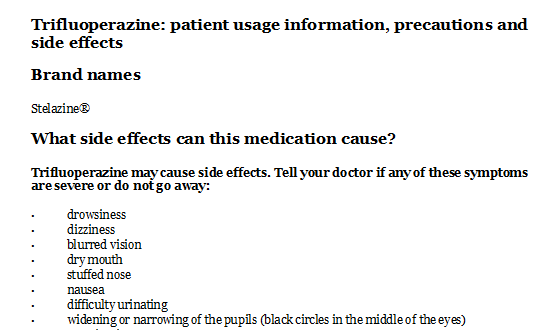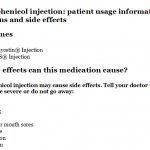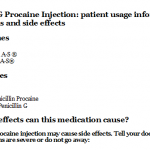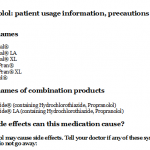
Trifluoperazine: patient usage information, precautions and side effects
Tuesday, May 30, 2017 by Gregory Van Dyke
http://www.naturalnewsreference.com/2017-05-30-trifluoperazine-patient-usage-information-precautions-and-side-effects.html

Trifluoperazine: patient usage information, precautions and side effects
Brand names
Stelazine®
What side effects can this medication cause?
Trifluoperazine may cause side effects. Tell your doctor if any of these symptoms are severe or do not go away:
-
drowsiness
-
dizziness
-
blurred vision
-
dry mouth
-
stuffed nose
-
nausea
-
difficulty urinating
-
widening or narrowing of the pupils (black circles in the middle of the eyes)
-
constipation
-
changes in appetite
-
weight gain
-
blank facial expression
-
shuffling walk
-
agitation
-
jitteriness
-
unusual, slowed, or uncontrollable movements of any part of the body
-
difficulty falling asleep or staying asleep
-
headache
-
extreme tiredness
-
weakness
-
breast enlargement
-
breast milk production
-
missed menstrual periods
-
decreased sexual ability in men
Some side effects can be serious. If you experience any of the following symptoms, call your doctor immediately:
-
fever
-
muscle stiffness
-
confusion
-
fast or irregular heartbeat
-
sweating
-
yellowing of the skin or eyes
-
flu-like symptoms
-
sore throat, chills, and other signs of infection
-
neck cramps
-
tongue that sticks out of the mouth
-
tightness in the throat
-
difficulty breathing or swallowing
-
fine, worm-like tongue movements
-
uncontrollable, rhythmic face, mouth, or jaw movements
-
seizures
-
blisters
-
rash
-
hives
-
itching
-
swelling of the eyes, face, mouth, lips, tongue, throat, arms, hands, feet, ankles, or lower legs
-
erection that lasts for hours
-
vision loss, especially in low light
If you experience a serious side effect, you or your doctor may send a report to the Food and Drug Administration’s (FDA) MedWatch Adverse Event Reporting program online (http://www.fda.gov/Safety/MedWatch) or by phone (1-800-332-1088).
Trifluoperazine may cause other side effects. Tell your doctor if you have any unusual problems while you are taking this medication.
IMPORTANT WARNING:
Studies have shown that older adults with dementia (a brain disorder that affects the ability to remember, think clearly, communicate, and perform daily activities and that may cause changes in mood and personality) who take antipsychotics (medications for mental illness) such as trifluoperazine have an increased chance of death during treatment.
Trifluoperazine is not approved by the Food and Drug Administration (FDA) for the treatment of behavior problems in older adults with dementia. Talk to the doctor who prescribed this medication if you, a family member, or someone you care for has dementia and is taking trifluoperazine. For more information, visit the FDA website: http://www.fda.gov/Drugs
Why is this medication prescribed?
Trifluoperazine is used to treat the symptoms of schizophrenia (a mental illness that causes disturbed or unusual thinking, loss of interest in life, and strong or inappropriate emotions). Trifluoperazine is also used on a short-term basis to treat anxiety in people who have not been helped by other medications. Trifluoperazine is in a group of medications called conventional antipsychotics. It works by decreasing abnormal excitement in the brain.
How should this medicine be used?
Trifluoperazine comes as a tablet to take by mouth. It is usually taken one or two times a day. Take trifluoperazine at around the same time(s) every day. Follow the directions on your prescription label carefully, and ask your doctor or pharmacist to explain any part you do not understand. Take trifluoperazine exactly as directed. Do not take more or less of it or take it more often than prescribed by your doctor.
Your doctor will probably start you on a low dose of trifluoperazine and gradually increase your dose. Your doctor may decrease your dose once your symptoms are controlled.
Trifluoperazine may help control your symptoms, but it will not cure your condition. Continue to take trifluoperazine even if you feel well. Do not stop taking trifluoperazine without talking to your doctor. If you suddenly stop taking trifluoperazine, you may experience withdrawal symptoms such as nausea, vomiting, dizziness, and shakiness. Your doctor will probably want to decrease your dose gradually.
Other uses for this medicine
This medication may be prescribed for other uses; ask your doctor or pharmacist for more information.
What special precautions should I follow?
Before taking trifluoperazine,
-
tell your doctor and pharmacist if you are allergic to trifluoperazine; other phenothiazines such as chlorpromazine, fluphenazine, perphenazine, prochlorperazine (Compazine), promethazine (Phenergan), or thioridazine; or any other medications.
-
tell your doctor and pharmacist what prescription and nonprescription medications, vitamins, nutritional supplements, and herbal products you are taking or plan to take. Be sure to mention any of the following: anticoagulants (blood thinners) such as warfarin (Coumadin); antidepressants; antihistamines; atropine (in Motofen, in Lomotil, in Lonox); barbiturates such as pentobarbital (Nembutal), phenobarbital (Luminal), and secobarbital (Seconal); diuretics (‘water pills’); epinephrine (Epipen); guanethidine (not available in the US); ipratropium (Atrovent); lithium (Eskalith, Lithobid); medications for anxiety, irritable bowel disease, mental illness, motion sickness, Parkinson’s disease, ulcers, or urinary problems; medications for seizures such as phenytoin (Dilantin); narcotic medications for pain; propranolol (Inderal); sedatives; sleeping pills; and tranquilizers. Your doctor may need to change the doses of your medications or monitor you carefully for side effects.
-
tell your doctor if you have or have ever had liver disease or any condition that affects your blood cells, including conditions that affect the production of blood cells by your bone marrow. Your doctor may tell you not to take trifluoperazine.
-
tell your doctor if you have or have ever had pheochromocytoma (tumor on a small gland near the kidneys), breast cancer, glaucoma (condition in which increased pressure in the eyes can lead to gradual loss of vision), seizures, chest pain, or heart disease. Also tell your doctor if you plan to work with organophosphorus insecticides (a type of chemical used to kill insects) or if you have ever had to stop taking a medication for mental illness due to severe side effects.
-
tell your doctor if you are pregnant, especially if you are in the last few months of your pregnancy, or if you plan to become pregnant or are breast-feeding. If you become pregnant while taking trifluoperazine, call your doctor. Trifluoperazine may cause problems in newborns following delivery if it is taken during the last months of pregnancy.
-
if you are having surgery, including dental surgery, tell the doctor or dentist that you are taking trifluoperazine.
-
if you are having a myelogram (x-ray examination of the spine), tell your doctor and the radiographer that you are taking trifluoperazine. Your doctor will probably tell you not to take trifluoperazine for 2 days before the myelogram and for one day after the myelogram.
-
you should know that this medication may make you drowsy and may affect your thinking and movements, especially at the beginning of your treatment. Do not drive a car or operate machinery until you know how this medication affects you.
-
ask your doctor about the safe use of alcohol during your treatment with trifluoperazine. Alcohol can make the side effects of trifluoperazine worse.
-
plan to avoid unnecessary or prolonged exposure to sunlight and to wear protective clothing, sunglasses, and sunscreen. Trifluoperazine may make your skin sensitive to sunlight.
-
you should know that trifluoperazine may make it harder for your body to cool down when it gets very hot. Tell your doctor if you plan to do vigorous exercise or be exposed to extreme heat.
-
you should know that there is a small chance that people who handle trifluoperazine tablets will develop a skin rash. Anyone who helps you take your medication should avoid touching the tablets directly.
What special dietary instructions should I follow?
Unless your doctor tells you otherwise, continue your normal diet.
What should I do if I forget a dose?
Take the missed dose as soon as you remember it. However, if it is almost time for the next dose, skip the missed dose and continue your regular dosing schedule. Do not take a double dose to make up for a missed one.
What should I know about storage and disposal of this medication?
Keep this medication in the container it came in, tightly closed, and out of reach of children. Store it at room temperature and away from excess heat and moisture (not in the bathroom). Throw away any medication that is outdated or no longer needed. Talk to your pharmacist about the proper disposal of your medication.
In case of emergency/overdose
In case of overdose, call your local poison control center at 1-800-222-1222. If the victim has collapsed or is not breathing, call local emergency services at 911.
Symptoms of overdose may include:
-
sleepiness
-
loss of consciousness
-
unusual, slowed, or uncontrollable movements of any part of the body
-
agitation
-
restlessness
-
fever
-
seizures
-
dry mouth
-
irregular heartbeat
What other information should I know?
Keep all appointments with your doctor and your eye doctor. You should have regularly scheduled eye exams during your treatment with trifluoperazine because trifluoperazine may cause eye disease.
Before having any laboratory test, tell your doctor and the laboratory personnel that you are taking trifluoperazine.
Trifluoperazine may interfere with the results of home pregnancy tests. Talk to your doctor if you think you might be pregnant during your treatment with trifluoperazine. Do not try to test for pregnancy at home.
Do not let anyone else take your medication. Ask your pharmacist any questions you have about refilling your prescription.
It is important for you to keep a written list of all of the prescription and nonprescription (over-the-counter) medicines you are taking, as well as any products such as vitamins, minerals, or other dietary supplements. You should bring this list with you each time you visit a doctor or if you are admitted to a hospital. It is also important information to carry with you in case of emergencies.
Why is this medication prescribed?
How should this medicine be used?
What special precautions should I follow?
What special dietary instructions should I follow?
What should I do if I forget a dose?
What side effects can this medication cause?
What should I know about storage and disposal of this medication?
Tagged Under: Tags: chemical medicine, medication, Pharma, Prescription Medicine





